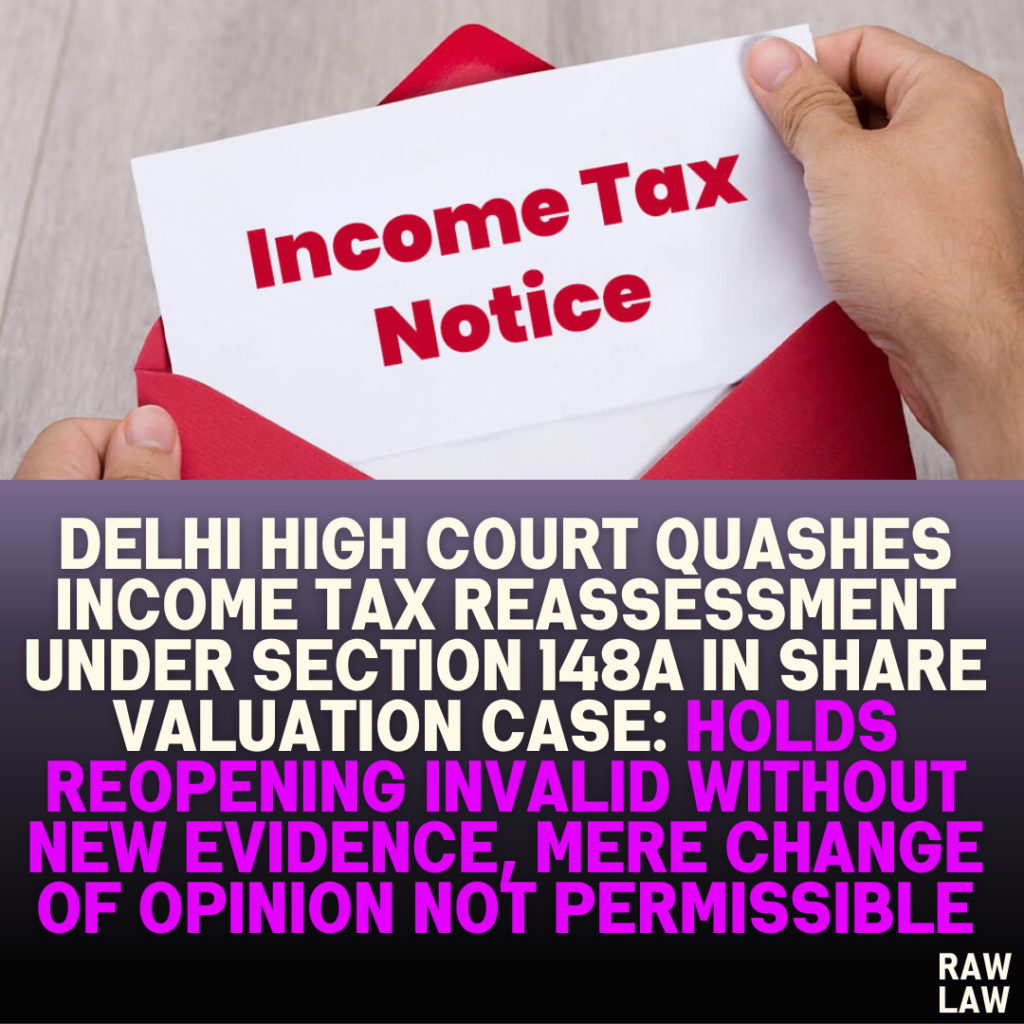Court’s Decision:
The Delhi High Court allowed the writ petition and quashed the reassessment proceedings initiated under Section 148A of the Income Tax Act, 1961, against the petitioner. The court ruled that the reassessment was based on a “mere change of opinion,” which is impermissible as per settled law. It held that the reassessment notice was not sustainable, as the issues in question had already been considered in previous assessments, including proceedings under Section 263.
Facts:
The petitioner, a company, had filed its income tax return for the assessment year 2014-15. During the original assessment, the petitioner’s investment in the shares of another company was scrutinized. The Assessing Officer (AO) was satisfied with the petitioner’s explanation regarding the shareholding pattern and passed an assessment order, declaring the petitioner’s income as ‘Nil’. Subsequently, the Principal Commissioner of Income Tax (PCIT) initiated proceedings under Section 263, alleging that the assessment order had caused a revenue loss of ₹6 crores. However, after considering the petitioner’s response, the PCIT dropped the proceedings.
Despite this, a notice under Section 148A(b) was issued two years later, reopening the assessment on the same issue, i.e., the alleged undervaluation of shares, leading to the current writ petition.
Issues:
Whether reassessment proceedings can be initiated based on a “change of opinion” when the matter has already been considered in earlier assessments.
Whether the provisions of Section 56(2)(viia) of the Income Tax Act apply in cases where shares are acquired under a ‘Right Issue’ at less than fair market value.
Petitioner’s Arguments:
The petitioner argued that the reassessment proceedings were initiated merely on a “change of opinion,” which is impermissible under law. It pointed out that the same issue had already been addressed in the original assessment, as well as in the subsequent Section 263 proceedings, where the PCIT had chosen to drop the case after considering the petitioner’s explanations. Furthermore, the petitioner contended that Section 56(2)(viia) of the Act did not apply since the shares in question were acquired as part of a ‘Right Issue,’ and not at undervaluation.
Respondent’s Arguments:
The respondents, representing the Income Tax Department, contended that the reassessment was justified as fresh facts had emerged, indicating that the shares had been purchased at a price significantly below their fair market value. They argued that the fair market value of the shares was ₹40 per share, while the petitioner had acquired them at ₹10 per share, resulting in escapement of income. The respondents also asserted that the proceedings under Section 263 had been dropped by the PCIT, but reassessment proceedings were initiated with the necessary approval from the higher authority, PCCIT.
Analysis of the Law:
The court referred to the legal principles governing reassessment under Section 147 and 148 of the Income Tax Act. Section 147 allows reassessment only if the AO has “reasons to believe” that income has escaped assessment, and this must be based on tangible material that was not available during the original assessment. The court emphasized that reassessment cannot be used as a tool for the AO to change their opinion on an issue already examined.
The court also discussed the applicability of Section 56(2)(viia) concerning undervaluation of shares but found that the provision did not apply to the petitioner’s case, as the shares were acquired under a ‘Right Issue.’
Precedent Analysis:
The court relied on the Supreme Court’s decision in Commissioner of Income Tax, Delhi vs. Kelvinator of India Limited (2010) and Union of India v. Ashish Agarwal (2023), which laid down the principle that a reassessment cannot be initiated on the basis of a “mere change of opinion.” It reiterated that reassessment powers are limited to cases where new, tangible material comes to light, and not when the AO merely wishes to review their earlier decision.
Court’s Reasoning:
The court reasoned that the reassessment was based on the same facts and circumstances that had already been examined during the original assessment and in the Section 263 proceedings. It held that the AO had no new material to justify reopening the case. Moreover, the fact that the proceedings had been dropped by the PCIT under Section 263 further weakened the case for reassessment.
The court rejected the respondent’s argument that the PCCIT’s approval for reassessment made the proceedings valid. It noted that even approval from a higher authority could not legitimize a reassessment action that was fundamentally flawed, as it was based on a “mere change of opinion.”
Conclusion:
The court quashed the reassessment proceedings, including the notices issued under Section 148A(b) and Section 148, and all consequential actions. It held that the reassessment was impermissible in law as it amounted to a review of the earlier assessment based on a “mere change of opinion.”
Implications:
This judgment reinforces the principle that reassessment cannot be used as a backdoor method for reviewing an assessment based on the same facts already considered by the AO. The decision will have significant implications for tax authorities and taxpayers alike, ensuring that the power of reassessment is exercised judiciously and not arbitrarily. It emphasizes the need for tangible new material to justify reopening an assessment, thereby protecting taxpayers from undue harassment.
